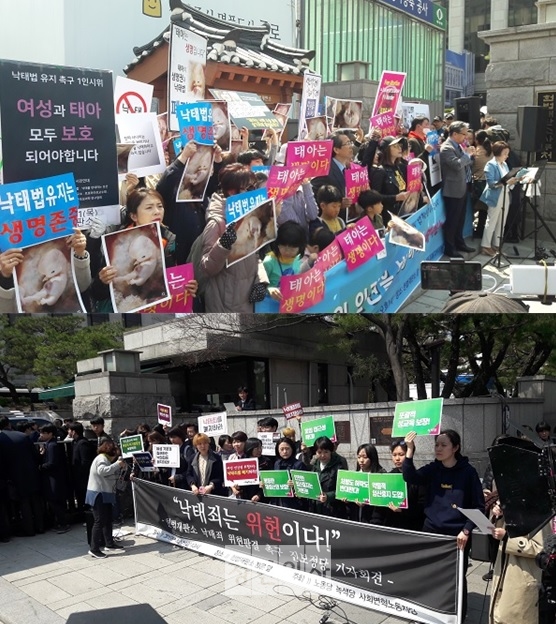The Constitutional Court on Thursday ruled that the provisions governing the punishment of a doctor who conducted a surgical abortion with the consent of a woman and the woman who received the abortion are inconsistent with the constitution.
The term “inconsistent with the constitution” is the decision that nullifies the law as virtually unconstitutional but allows it to exist temporarily until the National Assembly amend the law, to avoid any legal void and social confusion resulting from immediate nullification.

The Constitutional Court ruled that the Article 269, which prescribes punishment for self-induced abortion at any point during a pregnancy law, and Article 270, which states that a physician shall be imprisoned for up to two years if they infringe upon the women's right to free choice, are inconsistent with the constitution
Among the nine-member bench, four justices ruled the law was "inconsistent with the constitution," three "unconstitutional,” and two “constitutional.
“The provision of self-abortion prohibits abortion for all pregnant women in a completely and uniformly manner and punish violators with the only exceptions prescribed by the Maternal and Child Health Law,” said one of the justices who ruled the law inconsistent with the constitution. “As it forces pregnant women to keep their pregnancy and give birth to their baby, it limits their right to self-determination.”
The judge added, “The articles do not have the minimality to constitute a pertinent infringement while giving a general and absolute superiority to the public benefit from protecting the fetus’ life, and therefore they seem to run counter to the principle of balancing legal interests.”
Regarding the punishment of doctors who perform the abortion, the court ruled that “The provision of punishing a doctor who conducts abortion with the consent of a pregnant woman is also unconstitutional as it violates the Constitution by limiting women’s right to self-determination.”
The court, however, ruled, “If we rule Articles 269 and 270 as simply unconstitutional, it is impossible to punish all abortions made during the entire pregnancy period, resulting in an unacceptable legal void. Although the court has ruled the regulation inconsistent with the constitution, it is appropriate to continue to apply these articles until a legislative amendment is achieved.”
Legislators must implement the reform legislation by Dec. 31, 2020, at the latest, and unless the improved legislation is not made by that time, the provisions will lose their validity, the court added.
The justices who ruled the law unconstitutional said, “As cases affiliated with Article 269 were sporadic with the few cases having been caused by malignant motives, the legal provisions limited effect of preventing abortion and is not functioning properly as a punishment regulation. Even if we abolish these provisions, it will not result in extreme legal confusion or social costs.”
Justices Cho Yong-ho and Lee Young-jin, who voted the provision constitutional, noted that the fetus is also subjected to the constitutional right to life, and expressed the opinion that the state can prohibit abortion to fulfill the national task of realizing the dignity for human beings.
“To fulfill the tasks of the state which is to realize human dignity, the country can prohibit abortion, which deprives the fetus' life,” they said. “The state's obligation to protect life should also be applied to the infringement of the pregnant woman's fetus.”
Article 269 is intended to protect the life of the child by preventing the abortion of the pregnant woman, they added.
“Therefore, legislative purposes are justifiable, and the suitability of means to punish violators criminally is also recognized,” they noted. “Considering that abortion is widespread even though abortion is illegal, abortion will increase if abortion is decriminalized or receives a lighter punishment, and the legislative purpose of protecting the life rights of the fetus will not be achieved.”
Before the Constitutional Court ruling, demonstrators from both sides gathered in front of the Constitutional Court to stage fierce protests.
Those who sided with abolishing the ban on abortion argued that abortion should be removed as it threatens women's health rights, while those protest against the abolition claimed that the provision is essential to protect the lives of both the woman and the fetus, and urged the court to recognize the fetus as a life.

